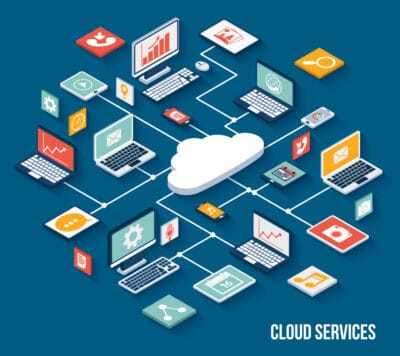
Data security is a major concern for companies, but larger enterprises often have the resources to access elaborate, customized systems to protect and back up their information. For smaller businesses on a budget, options are more limited, leaving business owners unsure of the best solution that fits their budget. For most of these small businesses, cloud storage services are an excellent option that can meet their needs for a fraction of the cost required for some alternatives. To determine whether cloud-based backup services for small businesses are the right solution for your company, read on to find out how these services work and what limitations and benefits you can expect.
What are the Best Cloud Backup Services for Your Business?
Cloud-based backup services are sometimes referred to as managed, remote or online backup services. No matter the title, backup as a service in cloud computing provides an off-site system that can back up, store and recover your company’s data. Typically the online backup service is hosted by a third-party provider with a variety of pricing options, depending on the amount of space needed, required bandwidth for transmission of data, servers needed, access required and number of users. The fees for this service can be monthly or annual, often with some savings for a yearly subscription. Companies can choose to pay for a public cloud service, offering space to anyone, or opt for a private service that limits the number of users on a server. There are also a number of cloud backup options to choose from, depending on your needs and preferences.
- Direct public cloud backup: This option allows you to back up your computer files directly to public cloud providers such as Microsoft Azure or Carbonite. These providers do not provide applications for backup, requiring businesses to use in-house compatible backup software, though they will have their own software to manage and store your data.
- Service provider backup: In this case, the cloud service provider hosts a managed data center for backup services. Backup software is sometimes provided as part of the service or options are given for commercially available applications.
- Cloud-to-cloud (C2C) backup: This is an option for businesses that already store their data in the cloud and are looking for a secondary backup service. Backup applications are generally included.
- Online cloud backup: These are hardware options that provide the ability to back up data locally on the device and also transmit a copy to the cloud. Generally, the most recent file copy is retained on the physical server, and backup software is included.

Benefits of Cloud Backup Services
Before deciding whether cloud backup services are the best choice for your business, it’s important to know the limitations and benefits that come with this option. Benefits of cloud systems include:
- Better data protection. Since many cloud systems already incorporate a number of security features, this could be an easy way to enhance security without the need for additional IT expenses.
- Customize based on your needs. Many cloud services offer a range of subscription options, allowing you to choose the package that most closely fits your needs within your budget.
- Off-site storage. Files are easily transmitted off-site to cloud storage, giving you peace of mind that on-site disasters won’t affect your ability to recover data.
- Remote access. Data stored in the cloud can be accessed from any device with an internet connection.
- Automatic options. Server cloud backup services can often be set up to run automatically, saving you time and preventing data loss due to forgotten backup scheduling.
Limitations of a Cloud Backup Service
Before signing up for your cloud backup services, make sure potential limitations are something you can live with. Some issues to consider are:
- Network connection required. If you have issues with your internet connectivity, this could pose a problem uploading or recovering files.
- Depends on a third-party server. If there are any issues with the provider you choose, there is always a chance your data could be lost through no fault of your own. It’s crucial to prioritize reliable file syncing to mitigate such risks.
- Bandwidth limits. Some providers limit the bandwidth allowed unless you are willing to pay an extra fee. If you have the need for a higher limit, the additional fees can add up and offset the savings you would have enjoyed. However, some top-tier providers now offer unlimited storage space as a standard feature, eliminating the need to worry about running out of space for your important files and data.
- Downtime. A service outage on the provider’s end will halt any scheduled backups and prevent recovery until they reestablish a connection.

Are Cloud-Based Backup Solutions Right for Your Small Business?
The choice to use cloud backups largely depends on the unique needs of your small business. If you’re operating on a budget and lack a professional IT support department, cloud backup services can be a great way to secure your data at an alternative location while still giving you access from anywhere you have an internet connection. On the other hand, if you are uncomfortable with leaving the security and storage of your backup files with a third party, cloud-based backup services may not be the best option. For many small businesses, however, cloud backup providers offer an affordable way to conveniently keep their computer files safe without breaking the bank.
Unlock Data Security: Transform Your Small Business with Cloud Backup Solutions
Is your small business prepared to confidently safeguard its data? Count on EIRE Systems to assist you in implementing cloud data backup solutions. Our skilled team comprehends the obstacles small businesses encounter, delivering comprehensive IT support to safeguard your data while maintaining budget constraints.
With our assistance, you can enjoy the peace of mind that comes with off-site data storage, remote access, and automatic backup options. Don’t let concerns about security or the technicalities of cloud backup hold you back. Contact us today to learn how EIRE Systems, the leading IT support services company in the Asia Pacific Region, can empower your small business with reliable and cost-effective cloud data backup services. Your data’s safety is our top priority – let’s take your business to the next level of data security and accessibility!
About the Author: EIRE Systems
EIRE Systems is a leading independent provider of professional IT, AV and Access Security services to the financial, insurance, manufacturing, health care, retail, construction, hospitality, commercial real estate, legal, educational and multinational sectors in Japan and throughout the Asia Pacific region. EIRE Systems has expertise across a wide spectrum of Information Technologies, with a track record for successfully completing hundreds of assignments since its establishment in 1996.


